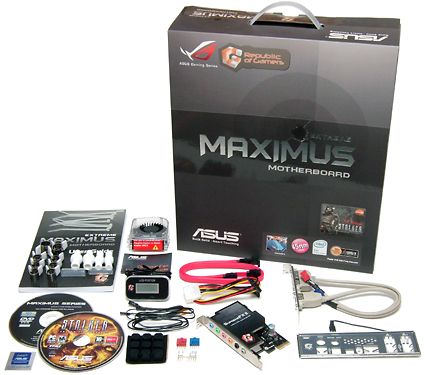X38 Comparison Part 2: DDR3 Motherboards
BIOS And Overclocking
The Maximus Extreme provides a wide range of overclocking controls, far beyond what's needed to reach the maximum speed of current hardware. In fact, the FSB clock range extends at least 200 MHz beyond chipset capability!
| BIOS Frequency and Voltage settings (for overclocking) | |
|---|---|
| FSB Frequency | 200 - 800 MHz (1 MHz) |
| Clock Multiplier Adjustment | Yes |
| DRAM Frequency | FSB clock x 1.0, 1.2, 1.6, 2.0 |
| PCIe Clock | 100 - 180 MHz (1 MHz) |
| CPU Vcore | 1.10 - 1.90 - 2.30 Volts (0.00625/0.0250 Volts) |
| CPU FSB Voltage | 1.20 - 2.00 Volts (0.02 Volts) |
| Northbridge (MCH) | 1.25 - 1.80 Volts (0.02 Volts) |
| Southbridge (ICH) | 1.05 - 1.225 Volts (0.025 Volts) |
| DRAM Voltage | 1.80 - 3.40 Volts (0.02 Volts) |
| CAS Latency Range | |
| tCAS: 4-11; tRCD: 3-18; tRP: 3-18; tRAS: 3-34 |
We reached a mildly-pleasing 506 MHz FSB clock (FSB2024) with our E6750 at 1.60 core volts and its stock 8x multiplier, with a remarkably stable 4.05 GHz CPU clock speed. The 1.60 V we used was measured using a voltmeter, and resulted from setting the CPU to 1.58750 V. Setting the motherboard to 1.60 V did increase our overclocking capability, but violated our test limits. The voltage damper has been renamed, but using the renamed setting to increase voltage stability only increased core voltage further beyond our 1.60 V limit.
Dropping the CPU core multiplier to 6x allowed a fantastic 548 MHz FSB clock to be reached with complete stability, indicating that the rest of the board is far more capable once CPU limits are removed.
Overclocking the Maximus Extreme revealed a bootstrap issue: using the 1.50 memory multiplier (3:2 DRAM:FSB ratio) forces a 266 MHz bootstrap that can easily overclock the northbridge too far, so a 1.60 multiple (8:5 ratio) was used instead. This didn't cause any problems for our DDR3-1600 RAM, but it's something to keep in mind.
Accessories
| Accessories | |
|---|---|
| Documentation & Software | Motherboard ManualMotherboard Driver DVDStalker Game DVD |
| Hardware | 1x SupremeFX II audio module1x Chipset Water Cooling Connector Kit6x Cable Ties9x Self-Adhesive Rubber Supports1x 80-conductor Ultra ATA cable1x Floppy Cable6x SATA Data Cable1x 4-pin to SATA power adapter (two-device)1x Port Breakout Plate (2x USB, 1x IEEE-1394)1x Heatpipe Cooling Fan (Supplemental)1x LCD Diagnostics Display Module1x I/O Panel Shield (Lighted)1x Asus Q-Connector Kit1x Asus Case Badge |
The Maximus Extreme includes a hose connector kit for attaching a liquid cooling system, plus an auxiliary cooling fan for builders who don't want to tie the chipset into the cooling loop. Anyone using a fan-assisted CPU air cooler should find the extensive network of passive sinks adequate, even when the board is heavily overclocked.
The installation kit includes nine self-adhesive rubber spacers to support the Maximus Extreme's extended front edge, and the package is further enhanced by the popular game Stalker: Shadow of Chernobyl. More software can be found on the installation CD, including Kaspersky Anti-Virus, Corel Snapfire Plus SE, and several Asus utilities.
Note that the board includes more cables than those shown, as one of the cable packs (Ultra ATA, Floppy, 4x SATA) was misplaced before this photo was taken.
Get Tom's Hardware's best news and in-depth reviews, straight to your inbox.
Current page: BIOS And Overclocking
Prev Page Asus Maximus Extreme Next Page Foxconn X38A Returns With Improved BIOS
